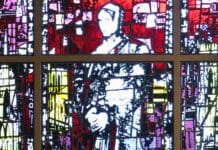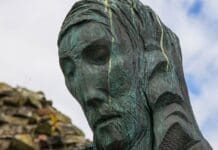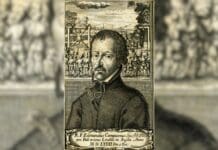In the year 596, some 40 monks set out from Rome to evangelize the Anglo-Saxons in England. Leading the group was Saint Augustine of Canterbury, the prior of their monastery in Rome. Hardly had he and his men reached Gaul (France) when they heard stories of the ferocity of the Anglo-Saxons and of the treacherous waters of the English Channel. Augustine returned to Rome and to the pope who had sent them— Pope St. Gregory the Great —only to be assured by him that their fears were groundless.
Augustine again set out and this time the group crossed the English Channel and landed in the territory of Kent, ruled by King Ethelbert, a pagan married to a Christian. Ethelbert received them kindly, set up a residence for them in Canterbury and within the year, on Pentecost Sunday, 597, was himself baptized. After being consecrated a bishop in France, Augustine returned to Canterbury, where he founded his see. He constructed a church and monastery near where the present cathedral, begun in 1070, now stands. As the faith spread, additional sees were established at London and Rochester.
Work was sometimes slow and Augustine did not always meet with success. Attempts to reconcile the Anglo-Saxon Christians with the original Briton Christians (who had been driven into western England by Anglo-Saxon invaders) ended in dismal failure. Augustine failed to convince the Britons to give up certain Celtic customs at variance with Rome and to forget their bitterness, helping him evangelize their Anglo-Saxon conquerors
Laboring patiently, Augustine wisely heeded the missionary principles—quite enlightened for the times—suggested by Pope Gregory the Great: purify rather than destroy pagan temples and customs; let pagan rites and festivals be transformed into Christian feasts; retain local customs as far as possible. The limited success Augustine achieved in England before his death in 605, a short eight years after he arrived in England, would eventually bear fruit long after in the conversion of England. Truly Augustine of Canterbury can be called the “Apostle of England.”


















Sumasalamin ang Salita ng Panginoon sa atin.
The Lord reflects his Word to us.
Nalaman natin sa ating ang budhi ay ang ating pananampalataya kay Kristo Hesus at nadaig tayo ng pagdarasal na kasama ang grasya ng Diyos.
Our faith to Christ Jesus allows us to see our conscience and overpower us in prayer with grace of God.
Ang mahalagang pagharap sa katotohanan, pag-asa, at pag-ibig ay banal na tadhana kasama ang Diyos.
A fundamental presence of truth, hope, and love is the divine providence with God.
My cousin could genuinely get cash in their extra time on their PC. their dearest companion had been doing this 4 somewhere around a year and at this point cleared the obligation. in their smaller than usual house and purchased an extraordinary Vehicle.
That is our specialty HERE====)> https://hignearningdoller.blogspot.com/
St.
Bernardine, please guide, protect, bless and protect me and my family, please intercede and help my youngest son the job he has been asking and dreaming of and will be granted and given to him in Jesus name, Amen.
St. Augustine pls. pray our family, Protect our family from all dangers, Purify our heart and mind to be in God alone no matter what problems comes in our home, Lord Jesus you are great defender @ healer, heal us physically, emotionally , financially, & spiritually. All these we ask w/ the help of St. Augustine & Mama Mary our Queen Mother to the Lord Jesus Christ our Lord & Saviour. Amen.
The eastern churches have saints for every day. It would be nice to see them posted also. Today is the feast of
St Therapontus in the east.
The Lord is going to give a healing to the masses soon, watch..
[…] post Saint Augustine of Canterbury appeared first on […]
SAINT. AUGUSTINE,,,,,,,
‘’’^^^^^^^^^^^^^^^ TAKE. ME. TO. WHERE. I. CAN. DO. OUR. LORD. JESUS CHRIST’S. WILL. ^^^^^^^
AMEN. !!!!!!!!!!!!
St. Augustine, pray for my family and friends.
St. Augustine, intercede for my family and friends.
O Lord our God, who by your Son Jesus Christ called your Apostles and sent them forth to preach the Gospel to the nations: we bless your holy name for your servant Augustine, first Archbishop of Canterbury, whose labours in propagating your Church among the English people we commemorate; and we pray that all whom you call and send may do your will, and bide your time, and see your glory; through Jesus Christ our Lord, who lives and reigns with you and the Holy Spirit, one God, for ever and ever. Amen.
Prayer to St. Augustine of Canterbury: God our Father, by the preaching of Saint Augustine of Canterbury, you led the people of England to the Gospel. May the fruits of his work continue in your Church. Grant that through his intercession, the hearts of those who err may return to the unity of your truth and that we may be of one mind in doing your will.
Dear Saint Augustine, we are honoured to have you as our Patron Saint. Help us as a parish to work in a spirit of trust and love, as well as a spirit of prudence and understanding, so that we may grow as God’s faithful. May harmony reign ever among us. Because of your example in living the Gospel, we dedicate ourselves, our families and our parish community, through your intercession to live that same Gospel. Implore on our behalf the favour of an ever-deepening trust in God’s goodness and love. Obtain God’s grace for us that we may grow in faith, hope, love and all virtues. Grant that by imitating you we may imitate our Lord and Master, Jesus Christ. Watch over us and help us to reach that place where you live with all the saints for ever and ever. Amen.
Lord God the Father Almighty, bless this parish of Saint Augustine of Canterbury in Humboldt, Saskatchewan. Bless all Benedictine monastic communities, and in particular, the Benedictine Oblates who live as faithful laity amidst chaotic uncertain times, in service of others. Saints Benedict and Scholastica, pray for us. Saint Augustine of Canterbury, share your gifts with these good people. Heal and help them in every way. Amen.
Saint Augustine of Canterbury pray for us amen